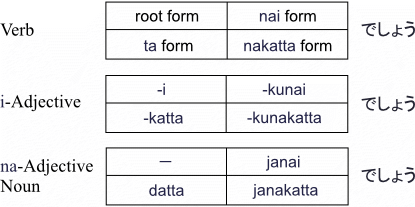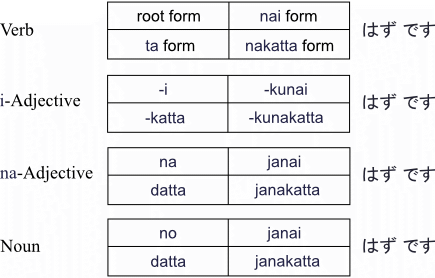|
|



|
でしょう Conjecture ; "It should be", "It must be"
でしょう follows the plain form at the end of a sentence to indicate conjecture or supposition.
This pattern shows that the speaker strongly believes what he/she has said is true. It has more definite sound than と おもいます.
This pattern also expresses speaker's impression with some surprise.

| 1. | 北海道の 冬は 寒いでしょう。 |
| It must be very cold in the winter of Hokkaido. |
北94,海64,道146,冬204,寒208
| 2. | 今日は 平日だから、映画館は すいているでしょう。 |
| There shouldn't be so many people in the movie theater since today is a weekday. |
今32,日19,平468,映396,画397,館417
| 3. | A | : | どう したんですか。 |
| B | : | 階段で 転んだんです。 | |
| A | : | 痛かったでしょう。 |
| A | : | What happened? |
| B | : | I fell from the stairs. |
| A | : | It must have hurt. |
階196,段197,転372,痛480
でしょうか? Indirect question
When でしょう is used in a question, it becomes an indirect question.
This is a polite way to ask someone something he/she is not responsible to know.
| 1. | スミス | : | 空港まで どのぐらい かかるでしょうか。 |
| 田中 | : | 30分ぐらいでしょう。 |
| Smith | : | Do you know (by any chance) how long it will take to the airport? |
| Tanaka | : | It should take about 30min. |
空63,港514,田67,中37,分29
| 2. | 加藤 | : | その ホテルに プールが あるでしょうか。 |
| 鈴木 | : | あるでしょう。大きい ホテルですから。 |
| Katoo | : | Would that hotel have a swimming pool? |
| Suzuki | : | Probably. It's a big hotel. |
加608,鈴1160,木23,大36,藤1925
はずです Conjecture ; "be expected", "should do"
はずです follows plain form and expresses a conjecture.
This pattern is used when the speaker tells his/her inference with certain factual information.

| ex. | Verb | ある はずです |
| i-Adj. | おいしい はずです | |
| na-Adj. | ひまな はずです | |
| Noun | らいしゅうの はずです |
| 1. | A | : | スミスさんは 今日 会社に いるでしょうか。 |
| B | : | ええ、いる はずです。大切な 会議が あるって 言っていましたから。 |
| A | : | Is Smith in the office today? |
| B | : | He should be. He said there is an important conference. |
今32,日19,会131,社133,大36,切346,議454,言121
| 2. | A | : | 田中さんは 打ち合わせの 時間を 知っているでしょうか。 |
| B | : | 知っている はずです。メールで 連絡 しましたから。 |
| A | : | Does Tanaka know what time we are having the meeting? |
| B | : | He should. I sent him an e-mail about it. |
田67,中37,打263,合132,時17,間100,知226,連541,絡542
いって きます "go and come back"
The verb きます (come) forms compound verbs with the te form of other verbs.
いって きます literally means "go and come back", かって きます literally means "buy and come back".
ちょっと is often added in order to imply that it is just a short time.
| 1. | ちょっと 銀行に 行ってきます。 |
| I'm going to the bank. |
銀169,行34
| 2. | ちょっと お弁当を 買ってきます。 |
| I'm going to get a lunch box. |
弁916,当304,買119
(Kanji numbers are from 2001.Kanji.Odyssey)
| Copyright (C) | CosCom Language Service, Inc. | All Rights Reserved. |